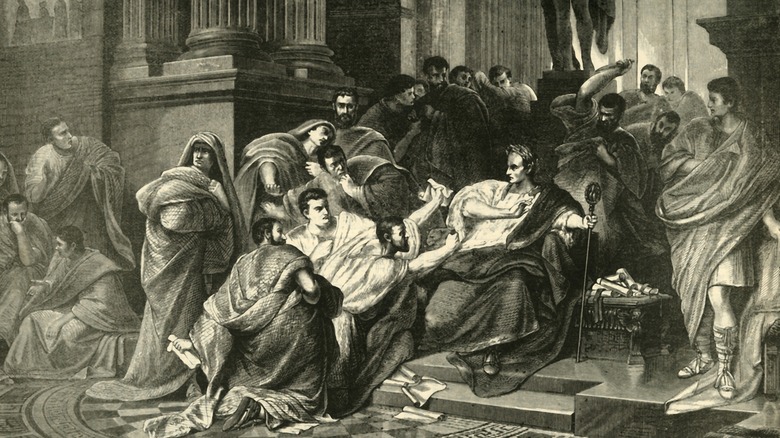The Surprising Way Brutus Tried To Raise Money For Caesar's Assassins
Nearly 2000 years ago, Marcus Junius Brutus — more commonly known as simply Brutus and Brute — orchestrated the most famous assassination and betrayal in history when a few dozen conspirators stabbed the famous Roman emperor Julius Caesar to death. Brutus was a long-time friend of Caesar. Interestingly, the emperor had an affair with Brutus' mother and often spared a younger Brutus when he joined Pompey against him in a civil war (via Livius).
Caesar had overtaken the Roman republic and turned it into more of a dictatorship, declaring himself leader for life, defeating the Senate, and committing other tyrannical acts. When it was clear that Caesar had no interest in restoring the republic, Brutus and around 60 senators began a scheme to kill the tyrant; Brutus was chosen as one of the plot's leaders given his close relationship to Caesar. Yet organizing such a high-profile assassination plot did not come without its expenses, and Brutus was led to make some unusual side-schemes to muster funds and support for Caesar's eventual killing.
Brutus tried to bribe with dinner
As the leader of the assassination plot, Brutus was in charge of convincing powerful men to join their cause and did so with a technique still used by politicians over two millennia later: a fundraising dinner. According to Mental Floss, Brutus approached a man named Titus Pomponius Atticus. Atticus was wealthy and well-respected, and Brutus hoped he would bankroll a band of Roman knights who agreed to dispose of Caesar for a moderate fee (via Attalus). The only issue was Atticus' neutrality: He was 60 when the war between Caesar and Pompey broke out and didn't see it as his place to interfere.
Caesar had been grateful to Atticus for his neutrality and even released prisoners on the latter's behalf. Getting the elder to fund the assassination of the Roman emperor after years of noninterference was certainly no easy task, so Brutus threw a lavish feast for Atticus in hopes that bread and beverage could bribe the man. It was no use, however — Atticus thought the plan too risky and turned down the invitation to the plot after he finished dinner. The senators took manners into their own hands, and on the Ides of March, they committed an assassination that is still talked about today.

